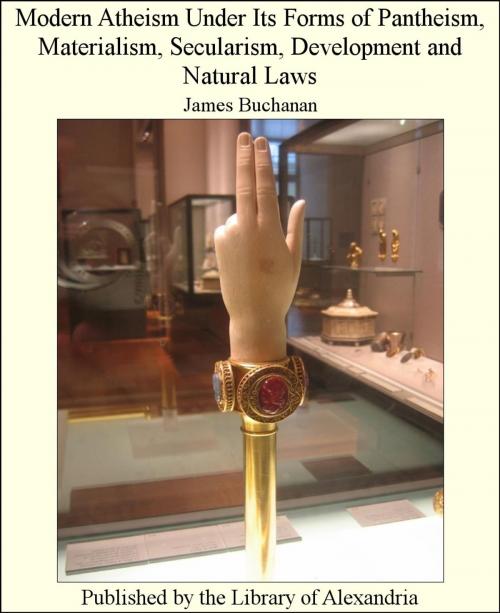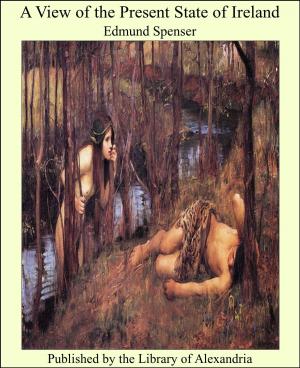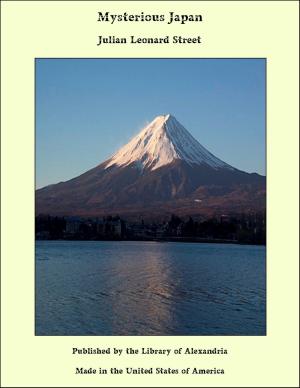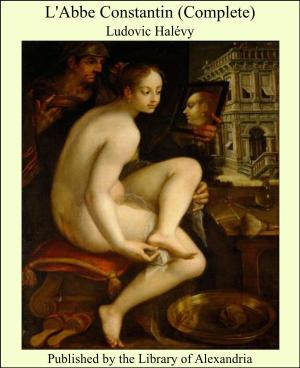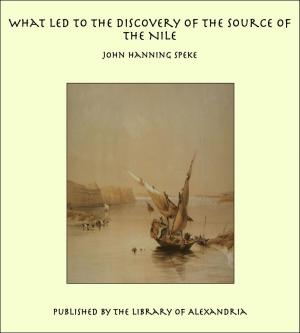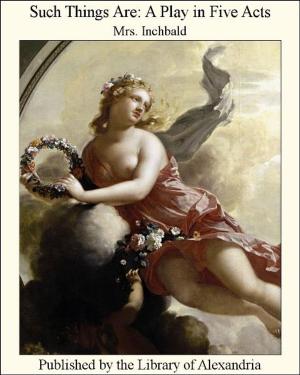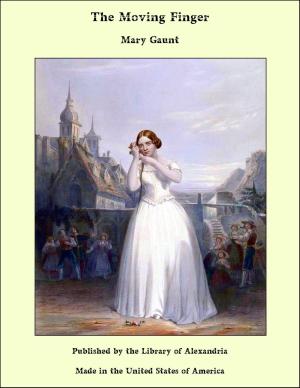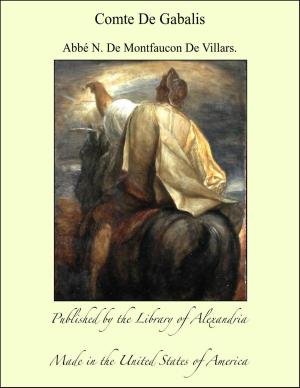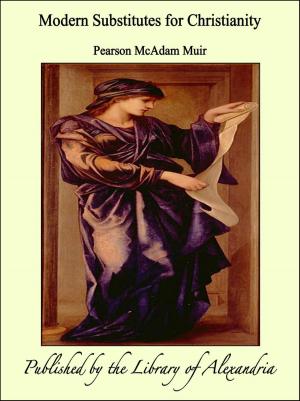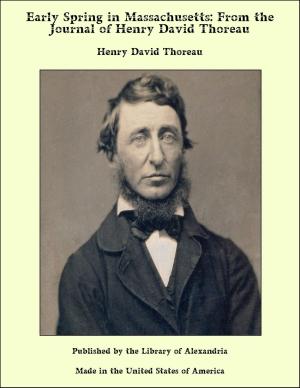Modern Atheism Under Its Forms of Pantheism, Materialism, Secularism, Development and Natural Laws
Nonfiction, Religion & Spirituality, New Age, History, Fiction & Literature| Author: | James Buchanan | ISBN: | 9781465523785 |
| Publisher: | Library of Alexandria | Publication: | March 8, 2015 |
| Imprint: | Language: | English |
| Author: | James Buchanan |
| ISBN: | 9781465523785 |
| Publisher: | Library of Alexandria |
| Publication: | March 8, 2015 |
| Imprint: | |
| Language: | English |
The contents of this volume originally constituted about one half of a work, entitled “Faith in God and Modern Atheism compared, in their Essential Nature, Theoretic Grounds, and Practical Influence.” Simultaneously with the first issue of that work in Scotland, the five principal chapters in this volume were published separately, accompanied with the announcement that each was complete in itself. The hint thus given by the author, has been acted upon by the present publishers. On examining the whole work, it was found to be divided into four Sections. Of these, the third was devoted exclusively to “Modern Atheism.” It embraced the five chapters already alluded to, together with a general introduction and four shorter chapters. It appeared, in fact, to be a complete treatise by itself; and it is now presented to the American public in the conviction that such a work is peculiarly demanded by the present state of religious opinion in this country. The author is one of the most distinguished divines of the Free Church of Scotland. In 1845, he was appointed Professor of Apologetic Theology in the New College, Edinburgh; and, on the death of Dr. Chalmers, in 1847, he was translated to the Chair of Systematic Theology thus made vacant. In the former position, it became his duty to prepare a complete course of Lectures on Natural Religion. His work on “Faith in God,” &c., contains, in an altered form, adapted to general readers, the substance of those Lectures. Respecting this work, the British press generally has spoken in the highest terms. The distinguished geologist, Hugh Miller, says, in the Edinburgh Witness: “It is one of, at once, the most readable and solid which we have ever perused;” and the News of the Churches, the organ of the Free Church, describes it as “a work of which nothing less can be said than that, both in spirit and substance, style and argument, it fixes irreversibly the name of its author as a leading classic in the Christian literature of Britain.” An American critic says: “His succinct analysis of the doctrines held by the various schools of modern atheism are admirable, and his criticisms on their doctrines original and profound; while his arguments in defence of the Christian faith against philosophical objectors are unsurpassed by those of any modern writer. Clear, vigorous, logical, learned, and strong as a Titan, he fairly vanquishes all antagonists by pure mental superiority; never understating their views or evading their arguments, but meeting them in all their force and crushing them.” another critic says: “It is a great argument for Theism and against Atheism, magnificent in its strength, order, and beauty…. The style is lucid, grave, harmonious, and every way commensurate with the dignity and importance of the subject…. The chapter on Pantheism is admirable. Regarding it as ‘the most formidable rival of Christian Theism at the present day,’ Dr. Buchanan seems to have specially addressed himself to the task of exposing and refuting this error. His statement of Spinoza’s system is beautifully clear.” The reader will find that there is no exaggeration in these encomiums. Hugh Miller, always felicitous in his choice of words, has exactly described the two leading characteristics of “Modern Atheism,” by the phrase “readable and solid.” Every one who begins the book will find himself drawn strongly onward to the end; and no one can rise from its perusal without a conviction that it contains a weight of argument against all the forms of Atheism such as never before has been combined in one book. Should the reception of this volume by the public furnish sufficient encouragement, it is the intention of the publishers to issue the remainder of the work (“Faith in God,” &c.), in uniform style
The contents of this volume originally constituted about one half of a work, entitled “Faith in God and Modern Atheism compared, in their Essential Nature, Theoretic Grounds, and Practical Influence.” Simultaneously with the first issue of that work in Scotland, the five principal chapters in this volume were published separately, accompanied with the announcement that each was complete in itself. The hint thus given by the author, has been acted upon by the present publishers. On examining the whole work, it was found to be divided into four Sections. Of these, the third was devoted exclusively to “Modern Atheism.” It embraced the five chapters already alluded to, together with a general introduction and four shorter chapters. It appeared, in fact, to be a complete treatise by itself; and it is now presented to the American public in the conviction that such a work is peculiarly demanded by the present state of religious opinion in this country. The author is one of the most distinguished divines of the Free Church of Scotland. In 1845, he was appointed Professor of Apologetic Theology in the New College, Edinburgh; and, on the death of Dr. Chalmers, in 1847, he was translated to the Chair of Systematic Theology thus made vacant. In the former position, it became his duty to prepare a complete course of Lectures on Natural Religion. His work on “Faith in God,” &c., contains, in an altered form, adapted to general readers, the substance of those Lectures. Respecting this work, the British press generally has spoken in the highest terms. The distinguished geologist, Hugh Miller, says, in the Edinburgh Witness: “It is one of, at once, the most readable and solid which we have ever perused;” and the News of the Churches, the organ of the Free Church, describes it as “a work of which nothing less can be said than that, both in spirit and substance, style and argument, it fixes irreversibly the name of its author as a leading classic in the Christian literature of Britain.” An American critic says: “His succinct analysis of the doctrines held by the various schools of modern atheism are admirable, and his criticisms on their doctrines original and profound; while his arguments in defence of the Christian faith against philosophical objectors are unsurpassed by those of any modern writer. Clear, vigorous, logical, learned, and strong as a Titan, he fairly vanquishes all antagonists by pure mental superiority; never understating their views or evading their arguments, but meeting them in all their force and crushing them.” another critic says: “It is a great argument for Theism and against Atheism, magnificent in its strength, order, and beauty…. The style is lucid, grave, harmonious, and every way commensurate with the dignity and importance of the subject…. The chapter on Pantheism is admirable. Regarding it as ‘the most formidable rival of Christian Theism at the present day,’ Dr. Buchanan seems to have specially addressed himself to the task of exposing and refuting this error. His statement of Spinoza’s system is beautifully clear.” The reader will find that there is no exaggeration in these encomiums. Hugh Miller, always felicitous in his choice of words, has exactly described the two leading characteristics of “Modern Atheism,” by the phrase “readable and solid.” Every one who begins the book will find himself drawn strongly onward to the end; and no one can rise from its perusal without a conviction that it contains a weight of argument against all the forms of Atheism such as never before has been combined in one book. Should the reception of this volume by the public furnish sufficient encouragement, it is the intention of the publishers to issue the remainder of the work (“Faith in God,” &c.), in uniform style
